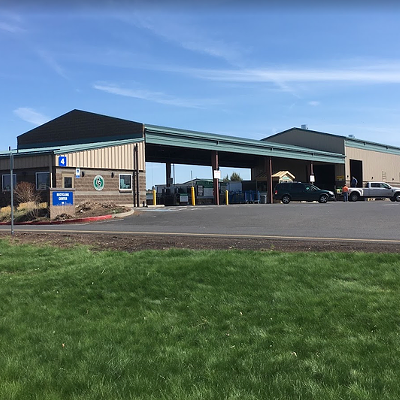For any heel-dragging doubters of global warming—a reality that will increasingly shape the livability of the planet—the Intergovernmental Panel on Climate Change, a panel of several hundred Nobel Peace Prize winning scientists, recently released a draft report that said, yes, beyond doubt global warming is happening and, what's more, it's happening at a rate faster than previously feared. If that wasn't enough bad news, scientists say "human influence" has a greater role than previously acknowledged.
Which is a lot like the captain of the Titanic warning that the hole in the ship's hull is larger than first reported. And, unless you truly believe that you are single-handedly smarter than several hundred scientists, it is perhaps time to recognize that the upcoming decade is critical to whether humans will curb carbon emissions and the rapid depletion of resources and create not only lifestyles, but entire cities that are truly sustainable.
"Bend is getting there," explained City Councilor Jodi Barram, "slowly but surely." She added, "I tend to think there is often room for improvement and innovation."
It is a humble, but entirely apt, assessment: Over the past couple of years, the city of Bend has implemented dozens of small changes to rechart the course of its operation and philosophy of doing business, a recalibration that has pushed energy savings and waste management toward sustainable practices. But, those changes, in a word, are a beginning, not an ending.
For example, City Hall has converted to draw 100 percent of its electric power from renewable energy, but other city buildings are only partially powered in this manner. (Non-transportation energy consumption, like that used to heat, cool and light buildings, is responsible for roughly one-third of all greenhouse gas emissions.)
Likewise, the department of Community Development also has made good pushes toward sustainability, like curbing carbon emissions from gas-burning vehicles—another major contributor to global warming—by purchasing hybrid vehicles and increasing staff commuting by foot, bike or carpooling to 25 percent of the workforce—a number roughly quadrupling national averages. But even those accomplishments are like congratulating a runner for completing the first several miles of a marathon, while the remainder remains to be finished.
A recent survey conducted by the Source of Bend's sustainability practices—and a comparison to what other cities are doing—found that Bend certainly has adopted good sustainability measures—especially in resource management and lessening energy consumption. But at a time when we should be running, not walking, toward sustainability practices—and, especially at a time when many other cities are stepping up their sustainability game—Bend remains rather informal and unfocused in its goals and efforts.
"We don't have a sustainability coordinator," lamented Brad Emerson, the city's special projects director. "I sure wish we did." Friendly and relaxed, he leans back in his chair, arms crossed over his head.
"We have been marching ahead," assures Emerson, "maybe not in a very visible fashion."
The lack of recognition of the City's sustainability efforts stems in part from the fact that while many of these projects and accomplishments are important, they are about as exciting as, well, changing a light bulb. In retrofitting the city's Centennial Parking Plaza downtown, solar panels were installed and energy-sucking light bulbs changed. "It wasn't pie-in-the-sky, but tangible things we could do," says Emerson.
Moreover, as Bend has been nipping and tucking, other cities have been very visibly overhauling. Consider outgoing New York City Mayor Michael Bloomberg, who arguably has done more than any other 21st century U.S. mayor to implement life-changing and planet-saving initiatives, including a successful push to ban smoking in bars and restaurants and a grandstanding attempt to ban massive servings of soda pop to bring children's obesity under control. He also has pushed big initiatives to encourage more bike commuting, taking extraordinary measures like removing an entire lane from the notoriously car-and-cab-choked First Avenue and rolling out a bike lane stretching the length of Manhattan. During his tenure, bike ridership has increased an astonishing 250 percent.
As sustainability has emerged as a guiding term over the past decade, it has assumed the role that environmentalism played in the '80s and '90s—and, in the process, expanded to include practices that also are economically and socially, well, sustainable. And, as the term sustainability has matured, so has the geographic center of the movement. During the nascent days of the most recent environmental movement, in the '80s and '90s, when individual residents were figuring out ways to lessen their own environmental impact through recycling, bike commuting and eating locally, many of these practices were best on display in progressive mountain towns like Boulder, Colo. and Burlington, as well as Bend. But since the turn-of-the-last-century, leadership for sustainability practices increasingly has come not from individual lifestyles, but from municipalities and local governmental bodies—and, especially from those located in city halls in LA, Chicago and New York, which were the greatest perpetrators of environmental sins in the '80s and '90s.
In 2009, for example, San Francisco became the first American city to implement a citywide composting program. Two years later, Portland followed that lead and, since then, regular garbage pickup has been halved to only every other week, a result that underscores the financial savings of such programs (that is, by halving what goes into landfills, it roughly doubles the lifespan for such sites, a massive savings to municipalities).
In response to an article the Source recently published regarding these accomplishments—and Bend's general lack of municipally sponsored composting—Councilor Barram submitted a letter to the editor explaining that Bend does, in fact, allow residents to throw compostables in with lawn clippings. But that allowance is a stark difference from outright encouraging, if not downright mandating, compositing; it is the difference between passively and aggressively addressing needs and opportunities for sustainability.
More telling, in a wide-reaching 2010 survey of 2,000 local governments, the International City/County Management Association found that cities with half-million-plus populations are doing much, much more than smaller cities to implement sustainable practices in the key areas, such as transportation, energy savings and resource conservation. For almost every indicator—from retrofitting facilities with higher-efficiency light to adding bike lanes—large cities (500,000 or more) way outpaced cities sized 50,000 – 99,999 in adopting sustainable practices. About the only category where smaller towns currently outperform large cities is by supporting local farmers markets—and even that is only by a scant number of respondents.
So far, sustainability measures by the city of Bend have been moderately noble, but not remarkable—more an informal endorsement than an ardent priority. In 2000, partly in response to the energy crisis throughout the West Coast, city council adopted a pledge and philosophy to chase down and enact sustainability measures. Several measures were enacted, but two years later, when council personnel changed, that overt commitment vanished. About the same time, at the turn of the century, a Sustainability Committee was formed with representatives from most city departments. According to Emerson, who served as the "convener," the committee brainstormed and encouraged new "behaviors and operations."
The list of accomplishments of the Sustainability Committee is scattered, but impressive. But, Emerson admits, that committee has not met for "several years," indicating that the economic downturn in 2006, when many city departments were downsized by 20 percent, made it difficult for city employees and department managers to tackle any additional projects.
"As we had to cover more jobs for people who were let go, we had less that we could focus on," Emerson explains. And, unlike large cities like New York, Chicago and even Portland, with billion-dollar budgets, Bend lacks the resources to roll out new projects.
Yet, while that argument garners understanding, it is also an explanation for Bend's recent low-key and informal approach to sustainability that ignores the imminent importance of global warming and fails to calculate that sustainable practices simultaneously address economic savings, that measures like reducing energy consumption and eliminating waste can ease budget constraints.
Emerson does acknowledge he has been working "extra time" to pull together a list of the city's sustainability accomplishments from the past few years. "By looking at the whole picture," he says, "we can ask, 'What are we missing here?'"
He goes on to explain that the Sustainability Committee "just needs a tangible reason to reconvene. I think that's out there."
He leans forward in his chair and pushes across his desk a sheet listing the priorities for the 2013 city council. The second bullet point reads: "Consider economic, environmental and social impacts of Council action."
More specifically, this month, representatives from the city of Bend will travel to Portland as part of a seminar with the Energy Trust of Oregon. Over the subsequent year, city employees will work to figure out an operational guide to sure that the city of Bend finds means to reduce its energy consumption and finds a truly sustainable plan.
It is too early to tell whether these recent stirrings mark a redoubled commitment by the city to sustainability, but with other cities visibly, actively and comprehensively addressing these issues—and with global warming worsening—the immediate question remains: If not now, when?























